Olympics review: The highs, lows and controversies of Tokyo 2020
The delayed Tokyo 2020 Olympics witnessed glory, despair and controversy, all under the shadow of the COVID pandemic.
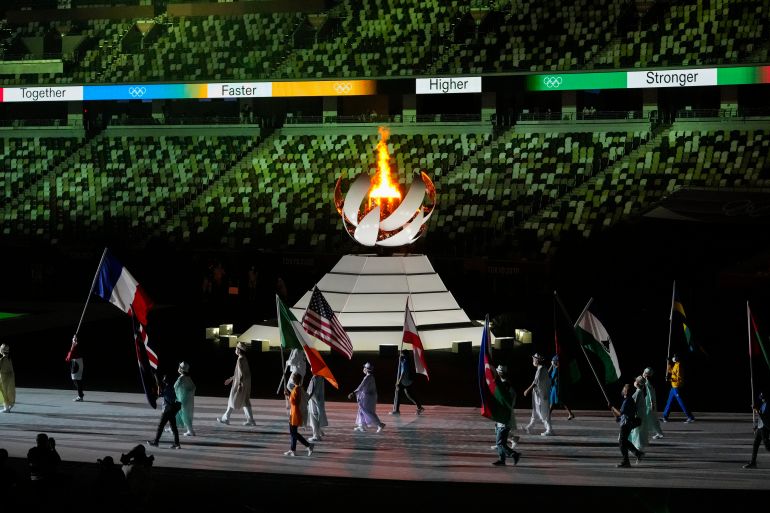
The delayed Tokyo 2020 Olympics has drawn to a close after two weeks of thrilling action as more than 11,600 athletes competed for glory.
No spectators were allowed into Tokyo’s Olympic stadium during the closing ceremony on Sunday, as was the case throughout the games as the coronavirus pandemic loomed large over the competition.
Keep reading
list of 4 itemsOlympics: Italy and Jamaica take sprint relay golds at Tokyo 2020
Why gymnast Simone Biles has transcended her sport
IOC expels Belarus coaches over Tsimanouskaya scandal
Nevertheless, the event saw many memorable moments; from historic sprinting wins, to legendary gymnast Simone Biles drawing praise for her mental health stance, to the scandal over a Belarusian sprinter, and sulking boxers.
The highs
The United States finished top of the medal table with 39 gold medals, one more than China at 38, and hosts Japan at 27.
Italy’s Lamont Marcell Jacobs won a shock men’s 100 metres gold, the first time someone other than the retired Jamaican legend Usain Bolt win the Olympic event since 2004. Jacobs’s 9.80-second victory also set a new European record.
Italy’s 4×100-metre sprint relay team, including Jacobs, went on to triumph in another astounding win that took Italy’s athletics gold tally in Tokyo to five – surpassing the previous best of three.
While the men’s result came as a surprise, Jamaica’s women sprinters predictably dominated their sprints, winning the 100m, 200m and 4×100metre relay races.
Jamaica’s Elaine Thompson-Herah became the first woman to win a “double-double”; winning gold in both the 100m and 200m races in Tokyo to retain her two golds in the same events at Rio 2016.
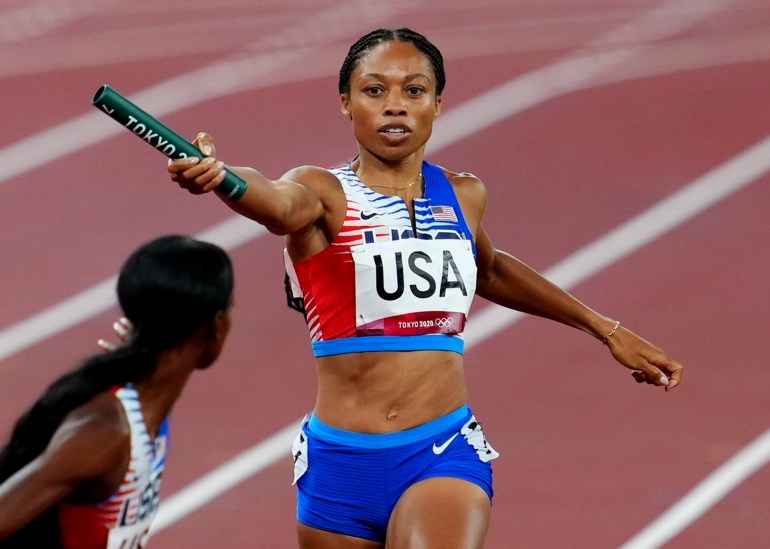
Meanwhile, US Sprinter Allyson Felix won a record 11th Olympic medal, becoming the most decorated track and field women Olympic athlete of all-time and the most decorated in US history. Felix achieved the feat by winning gold in the 4×400-meter relay on Saturday.
Indian javelin thrower Neeraj Chopra made history winning his country’s first-ever Olympic track and field gold.
In swimming, 18-year-old Ahmed Hafnaoui of Tunisia shocked the sporting world after winning the 400 metres freestyle.
Hafnaoui went into the final race with the slowest qualifying time of the eight swimmers. His win was only the fifth medal for Tunisia in Olympics history.
For the first time ever, the Olympics featured skateboarding as an event – with Japan’s Momiji Nishiya, 13, clinching gold in the women’s street skateboarding competition to become the country’s youngest gold medal winner.
Surfing also made its Olympics debut, with Brazil and the US taking golds in the men’s and women’s competitions respectively.
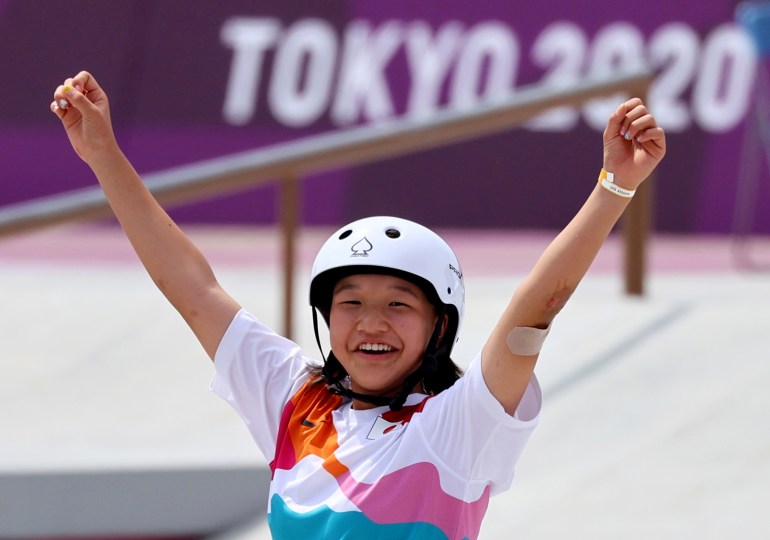
The lows
In an extraordinary scene, French boxer Mourad Aliev protested by refusing to leave the ring for an hour or so after he was disqualified for an intentional head butt.
“I would have won, but it had already been written that I was disqualified,” Aliev said in his post-match remarks. “I prepared my whole life for this, so getting mad about this result is natural.”
In athletics, the US men’s relay team’s failure to qualify for the 4×100-metre final was panned by critics as a “total embarrassment”.
Despite entering the Olympics with three of the world’s fastest runners in 100 metres, the relay team came sixth in the semifinals.
The USA team did everything wrong in the men's relay. The passing system is wrong, athletes running the wrong legs, and it was clear that there was no leadership. It was a total embarrassment, and completely unacceptable for a USA team to look worse than the AAU kids I saw .
— Carl Lewis (@Carl_Lewis) August 5, 2021
In tennis, Australia’s Ashleigh Barty, the number one player in the world, lost in the first round in straight sets to Spain’s Sara Sorribes Tormo 6-4, 6-3.
Japanese hero Naomi Osaka also crashed out early, after losing in the third round 6-4, 6-1 in under an hour.
The inspirations
US Gymnast Simone Biles pulling out of several competitions to focus on her “mental health” was a major talking point throughout the Olympics.
Biles, considered the greatest gymnast of all time, dropped out after suffering an injury during a team vault competition and subsequently sat out five out of six events.
“There is more to life than just gymnastics … We have to protect our mind and our body rather than just go out there and do what the world wants us to do,” she said.
While some pundits and people on social media criticised her decision, Biles received an outpouring of support and praise for her difficult decision. Biles later went on to win the bronze in the women’s balance beam event.
One of the most touching moments of the competition came from Brazilian and Australian skaters who rushed to comfort Japanese sensation Misugu Okamoto, who went into the finals in the lead but repeatedly failed to land one of her tricks in the finals.
Wiping away tears, the 15-year-old was lifted by her fellow competitors onto their shoulders to celebrate her performances.
Qatar’s Mutaz Barshim and Italy’s Gianmarco Tamberi choosing to share a rare Olympic athletics gold in the high jump was hailed by many as one of the best moments of the games.
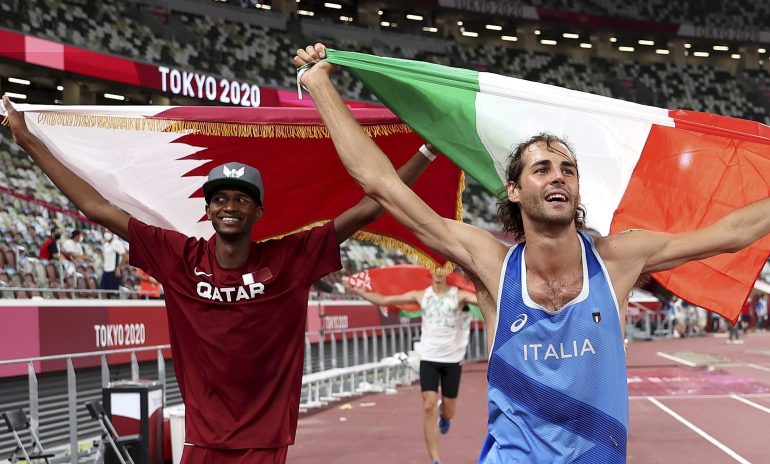
While they made the 2.37 metres jump, both failed to clear the Olympic record of 2.39 metres.
Looking at a face-off to decide the ultimate winner, Barshim asked the authorities if they could share the gold – a move which was allowed by authorities and happily accepted by Tamberi.
The athletes embraced in jubilation with media pundits and audience alike praising the pair for their sportsmanship.
Meanwhile, female athletes campaigned for gender rights at the games, with the German women’s gymnastics team wearing unitards instead of bikini-cut leotards to make a statement about the sexualisation of female athletes.
The Olympics also saw a record number of gay, lesbian, bisexual and transgender athletes competing.
More than 180 openly LGBTQ people competed, according to website Outsports – triple that of Rio in 2016 – demonstrating a surge in visibility, acceptance, and success for LGBTQ Olympians.
The controversies
The case of Belarus sprinter Krystsina Tsimanouskaya renewed focus on the continuing political discord in the former Soviet Republic.
The controversy unfolded when the 24-year-old refused to board a plane back to Minsk, subsequently requesting protection from Japanese police. Tsimanouskaya claims her team attempted to force her to fly home against her wishes after she criticised their decisions.
On Wednesday, the sprinter landed safely in Poland after receiving a temporary visa on humanitarian grounds.
Karate’s historic debut at the Olympics ended in an uproar during its final bout as Saudi Arabia’s Tareg Hamedi was disqualified for a high kick that left his opponent, Iran’s Sajad Ganjzadeh, unconscious but awarded gold in the men’s over-75kg final.
Meanwhile, the pandemic meant the games were long shrouded in controversy and protest, as renewed waves of the coronavirus threatened to postpone the Olympics a second time after a one-year delay.
Some 100 cases were linked to the competition before the opening ceremony, with infections growing to more than 400 as the Games went on.
Tokyo saw a surge in infections repeatedly breaking the city record for most daily cases recorded since the pandemic began, although organisers appear to have prevented the games from becoming a much-feared COVID-19 super-spreader event.
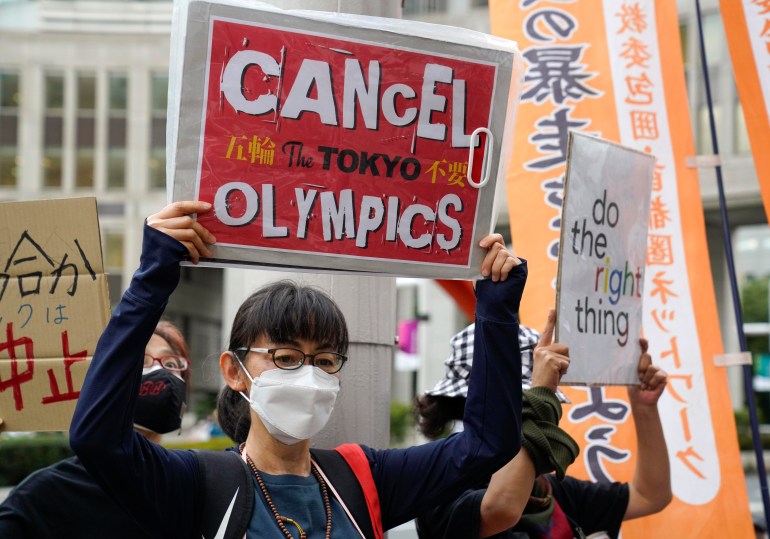
Several protests took place in the city with hundreds attending, demanding the International Olympic Committee and Japanese authorities scrap the games.
According to an Ipsos poll surveying 28 countries days before its start, 78 percent of Japanese respondents said the Olympics should not go ahead due to safety concerns.
While support for hosting the Games seemingly grew as the Olympics went on, the Japanese government’s likability tanked, with some polls showing less than 30 percent support for Prime Minister Yoshihide Suga.
Meanwhile, Japan is saddled with a $15bn bill, double what it initially expected.